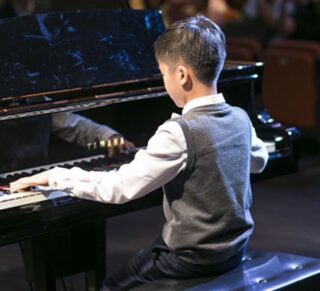1. Boosts Confidence
Performing in front of an audience is one of the most effective ways to build a child’s confidence. The experience of successfully presenting their music fosters a sense of accomplishment and self-belief. This newfound confidence can have a ripple effect, positively impacting other areas of their life, such as academics and social interactions.
2. Enhances Stage Presence
Regular performances teach children how to manage stage presence. They learn to project their voice, maintain eye contact, and convey emotion through their music. These skills are invaluable not just in music, but in any situation where they need to present themselves, whether in school presentations or future professional settings.
3. Teaches Resilience
Performing isn’t always smooth sailing. Kids may experience stage fright, make mistakes, or face unexpected challenges. Learning to cope with these situations teaches grit and the ability to recover from setbacks. It’s a powerful lesson in handling pressure and persisting despite difficulties.
4. Creates a Sense of Achievement
There’s nothing quite like the feeling of finishing a performance and receiving applause. It’s a tangible reward for all the hard work and practice. This sense of achievement motivates children to continue improving and striving for excellence in their musical journey.
5. Improves Focus and Discipline
The preparation for a performance requires intense focus and discipline. Children learn to fine-tune their skills, pay attention to details, and adhere to a practice schedule leading up to their performance. These skills in focus and discipline translate into other areas of their lives, enhancing their overall academic and personal growth.
6. Strengthens Musical Expression
Performing allows children to express themselves musically in a way that practice alone doesn’t. They get to share their interpretation of a piece with others, which can be deeply fulfilling. This opportunity for self-expression can also help them connect more deeply with the music they’re playing.
7. Builds Social Skills
Whether it’s performing in a school recital, a community event, or a family gathering, music performances often involve interacting with others. Kids learn to engage with their audience, handle social situations gracefully, and collaborate with fellow musicians. These interactions build strong social skills and help them feel more comfortable in various social settings.
8. Fosters a Love for Music
Performances are often the highlight of a child’s musical experience. They provide a chance to showcase their progress and celebrate their achievements. The joy and excitement associated with performing can deepen their love for music and inspire them to continue their musical journey with enthusiasm.
Tips for Encouraging Performances
- Start Small: Begin with low-pressure performances at home or with close friends and family. Gradually build up to larger events as your child becomes more comfortable.
- Make It Fun: Create a positive and enjoyable experience around performances. Celebrate their efforts and achievements!
- Provide Support: Offer encouragement and reassurance before and after performances. Let them know that mistakes are a normal part of the learning process.
- Seek Opportunities: Look for recitals, talent shows, or community events where your child can perform. Regular opportunities to showcase their talent will build their confidence and experience.
Performing is an integral part of music education that offers a multitude of benefits. It boosts confidence, enhances stage presence, teaches resilience, and improves focus. Seek out a music teacher who values performing and offers many opportunities to do so. By encouraging your child to perform regularly, you’re helping them grow as a musician and as a person. So, let’s embrace the spotlight and celebrate the magical moments of performance that make the journey of music truly special!
